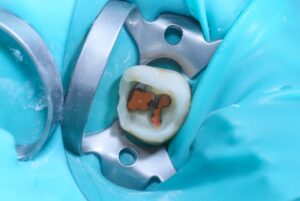Referral of services or products happens all the time in today’s world. Everyone from local garages to restaurants will recommend another establishment if they are unable to meet a customer’s needs. The individual will rarely think poorly of the business, who is helping to find a solution to their problem. Of course, referrals occur routinely within the healthcare sector too, particularly when a patient requires multidisciplinary or advanced care. General dental practitioners (GDPs) will frequently refer to specialists if a patient presents with a complex issue. Understanding factors affecting the clinical decision-making process, as well as how to streamline the workflow are important for the very best patient experience.
Motivating factors
There are several reasons for referring patients to undergo specific treatment elsewhere. Typically, it is utilised when a patient requires treatment that is outside of the clinician’s remit. This could either be legally beyond their scope of practice or simply not something they are confident doing. While referrals are most often made by GDPs, a specialist may also refer a patient for procedures by an expert in another field.

The litigious landscape in dentistry right now encourages clinicians to err on the side of caution, which has created a busy referral market. For example, in periodontology, concerns over potential medico-legal consequences are a major driving force of referrals.[i] There is particular hesitance among GDPs – especially those working within the NHS – to treat more advanced forms of periodontal disease.
In endodontics, fear of litigation is also a contributing factor for referrals. It has previously been suggested that patient complaints relating to root canal treatment are more difficult to defend against than other clinical modalities.[ii] This could exacerbate any concerns GDPs have about treating endodontic cases and increase the likelihood of referral.

Decision-making
Research has found that patients are most commonly referred for the root treatment of maxillary incisors and first permanent molars with challenging anatomy, needing retreatment or with traumatic injury.[iii] All of these present complex situations and require comprehensive solutions, supporting the need for referral to specialists in the area.
The criteria for endodontic referral seem to depend on the clinician’s personal experiences and clinical skill. A study[iv] of UK postgraduate dentists found considerable variation between participants’ perceptions of complexity when faced with three different cases. The paper found that procedural predictability technical difficulty, risk of damage to the tooth and patient preference were the main factors affecting the decision-making process.

Optimising the journey for all
When you do choose to refer, it’s important to provide comprehensive patient information to streamline the process and optimise clinical outcomes. A UK study published in 2020[v] found that as many as 16% of oral surgery referrals included no medical history for the patient and 87% had no supporting radiographs. This would have delayed the treatment process with the receiving specialists needing to acquire the information before they could plan treatment.
For a more efficient treatment experience for the patient and the professional team, the GDP should send all relevant details with the referral. This should include a full medical and social history, the patient’s latest radiographs and/or CBCT scans and clinical photographs, in addition to information on the referral treatment required.
It is also useful to ensure that the patient is fully informed about why they have been referred. I couldn’t count the number of times a referred patient has sat in my chair without any idea about what treatment I should be providing or what it roughly entails. Now, this might simply be a case of poor memory or a lack of attention for their routine dentist. But doing what you can as the GDP to make sure the patient understands the basics of the treatment they are being referred for, can make the process more pleasant for them. It also highlights the quality of care you are committed to delivering when you can show that you are acting in their best interests to ensure the most appropriately trained professional is chosen for the treatment needed.
The referral pathway is further improved when you can give the patient a little information on the practice or specialist they will be seeing. That’s why it’s beneficial to build a relationship with your preferred specialist practice, so you know exactly what your patient should expect. This also affords confidence in the quality of care your patient will receive, which can further be relayed to them as reassurance.
For any clinicians needing to refer patients for advanced endodontic treatment, EndoCare provides a team of experts and registered specialists in the field. We utilise cutting-edge equipment and evidence-based techniques to deliver exceptional patient outcomes. We will also keep you in the loop every step of the way as the referring clinician and provide any further support you may need once the patient returns to you for their on-going routine care.

For further information about the endodontic referral services available from EndoCare, please call 020 7224 0999 or visit www.endocare.co.uk
 EndoCare, led by Dr Michael Sultan, is one of the UK’s most trusted Specialist Endodontist practices. Through the use of the latest technologies and techniques, the highly-trained team can offer exceptional standards of care – always putting the patient first. What’s more, EndoCare is a dependable referral centre, to which dentists from across the country send their patients for the best in specialist endodontic treatment.
EndoCare, led by Dr Michael Sultan, is one of the UK’s most trusted Specialist Endodontist practices. Through the use of the latest technologies and techniques, the highly-trained team can offer exceptional standards of care – always putting the patient first. What’s more, EndoCare is a dependable referral centre, to which dentists from across the country send their patients for the best in specialist endodontic treatment.
[i] Sharpe, G., Durham, J. & Preshaw, P. Attitudes regarding specialist referrals in periodontics. Br Dent J 202, E11 (2007). https://doi.org/10.1038/bdj.2007.141
[ii] Easson E. Pulp fact – looking inside endodontic claims. DDU Journal. Issue 3. https://ddujournal.theddu.com/issue-archive/issue-3/pulp-fact—looking-inside-endodontic-claims [Accessed May 2025]
[iii] Wootton, J., Forrest, M., Patel, M. et al. A service evaluation assessing the root canal referral and treatment pathway within the Royal London Dental Hospital. Br Dent J (2025). https://doi.org/10.1038/s41415-024-7841-6
[iv] Liew J, Zainal Abidin I, Cook N, Kanagasingam S. Clinical decision-making in complex endodontic cases between postgraduate students across dental specialties at a UK dental school: A pilot study. Eur J Dent Educ. 2022 Nov;26(4):707-716. doi: 10.1111/eje.12751. Epub 2022 Jan 2. PMID: 34936724.
[v] Sivarajasingam, V., Lewis, K., Athwal, J., Mort, J., Emanuel, C. and Morgan, M.Z. (2020), Oral surgery referrals at a UK dental hospital in the context of a managed clinical network: a mixed-methods study. Oral Surg, 13: 212-220. https://doi.org/10.1111/ors.12478
















